Share
A time for family and remembrance
By Colonel (Retired) Neil Gibson, MD, FACP, FRCPC
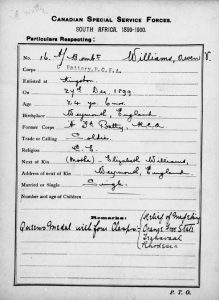
This year, I was asked by my good friend and colleague Dr. Scott McLeod to write a submission about Remembrance Day for Messenger. At first, I was hesitant as I am not a gifted writer, but in a deeper sense, Remembrance Day for me is a very personal time for family, reflection and memories. Five generations of my family have been involved with medicine and the military both directly and indirectly, and I have been fortunate not to have lost any of them to war.
My great-grandfather was a pharmacist in Athens, ON who volunteered for the South African (Boer) War. The Canadian Expeditionary Force had no positions for his medical training, so he joined as an artilleryman and fought in the Royal Canadian Field Artillery. He returned to his practice upon his return in 1901, but I know little of his experiences, as he became estranged from his family following his service.
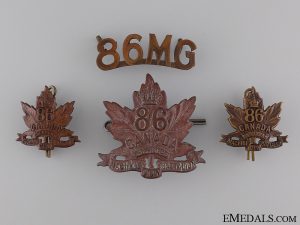 The insignia that Dr. Gibson’s grandfather, Captain E. Lyle Gibson, wore in the First World War
The insignia that Dr. Gibson’s grandfather, Captain E. Lyle Gibson, wore in the First World War
My grandfather joined the military in Hamilton, ON at the outset of the First World War; his attestation documents list his occupation as “medical student.” He was gassed and wounded at the Battle of Passchendaele while leading a machine gun unit as a Lieutenant and was sent to England for recovery. Even though his injuries appear to have been relatively mild, he did not return to the front. I think the single line in his medical documents stating “battle fatigue” explains why-battle fatigue was the term used to describe PTSD in that era. He did not return to medicine upon arriving home and instead, opted to become a teacher. My grandfather never did talk with us about his experiences with war, and the subject clearly was one he wished to avoid. Much like Lieutenant-Colonel Patton, who wrote last year’s Remembrance Day column for Messenger, I also keep my grandfather’s medals in a tin cookie container.
My father joined the Royal Canadian Air Force (RCAF) while in medical school. I was indoctrinated into the military life early on, as I was born while he was posted to Canadian Forces Station (CFS) Aylmer in Ontario, before we relocated to CFS MacDonald in Manitoba. He eventually retired from the Regular Force, but subsequently joined the Reserves and had the honour of being the Commanding Officer of two Reserve units: the 12th Medical Company in Kitchener, ON and the 16th Medical Company in Hamilton, ON.
A fond memory of mine is visiting CFS MacDonald with my father eight years ago, before he passed away. When CFS MacDonald closed, it was sold to a Hutterite colony that has largely left the infrastructure in place and they graciously allowed us to visit. It was fascinating to be able to walk the runway and look at the old buildings while reminiscing with my father about the times he and his fellow service members had in the very close-knit RCAF community.
I started in the military as an Armoured Corps Officer in the Reserves and pursued medicine in the military by transferring to the Regular Force, serving for 32 years in total. Some of my most enriching and most disturbing medical experiences occurred in this service-particularly during six rotations running the ICU in the Multinational Medical Unit in Kandahar, Afghanistan.
This experience brought home in spades the wanton destruction that indiscriminate warfare can do to the human body and most distressingly, to civilians caught in the conflict. These were the cases that had the most profound effect on us. The resulting camaraderie among members of the medical team was the most intense and enduring that I have seen, and we supported one another relentlessly.
Our family saga continued when my daughter Katy chose medicine and the military as her career path. She has since completed her service and retired after serving as a Medical Officer on deployments to Honduras, Iraq and Lebanon with Syrian refugees. I proudly stood with her at the National Cenotaph in Ottawa on Remembrance Day in November of 2017.
As you can see, Remembrance Day for my family and I is not only about an important day in history when the First World War reached armistice. For us, it truly is about family and taking time to reflect and remember the tremendous commitment and sacrifice that service members across Canada have made for generations. I would like to reiterate how truly fortunate my family has been to not have lost anyone to war; however, the residual effects of military work have certainly left elements of psychological impact on my family, as it did alter relationships and choices in the fabric of my family’s story.
My humble request to the readers of this article is that we all stop and take time to recognize that our ability to reflect and understand once a year is more than a date in a calendar. It is an opportunity, if not a responsibility, to appreciate and honour the sacrifice that veterans have made so we may freely enjoy the nation in which we live. I hope that my personal vignettes put some meaning to these sentiments.
Colonel (Retired) Neil Gibson is a General Internist who practises primarily in Critical Care at the Sturgeon Community Hospital in St. Albert. He served for 32 years in the CAF, 25 as a Medical Officer. During his career, he was deployed to northern Canada, the U.S.A., the U.K., Norway, Cambodia, Somalia, Eritrea, Haiti and six rotations to Kandahar (Dr. McLeod was a colleague on one of those rotations). He is supported by his wife of 37 years and two daughters; one a former CF physician and the other a professional ballerina currently working in Germany.






















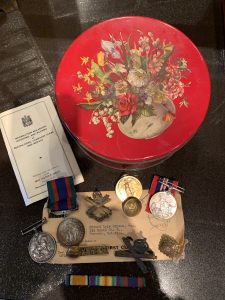

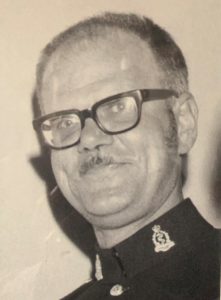

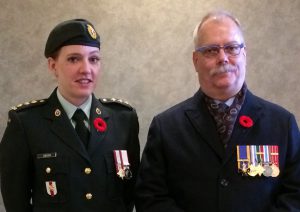
Comments for this post are now closed. If you would like to share your feedback on this topic, please email support@cpsa.ca.